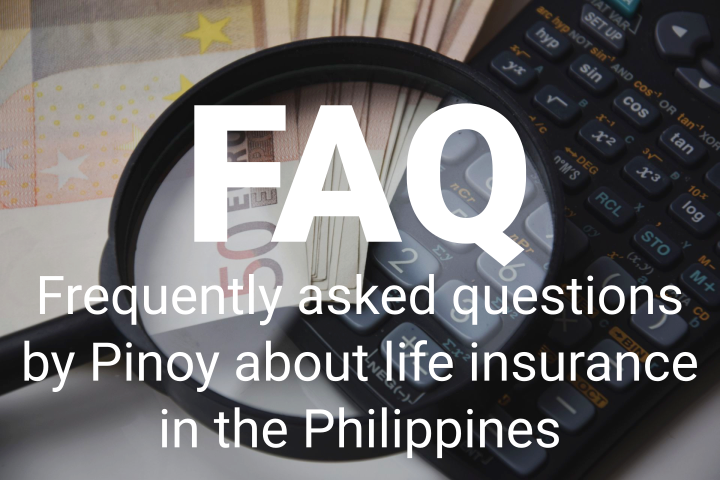Faq Frequently Asked Questions Every Pinoy Must Know Life Insurance Philippines

Life insurance is an important aspect of financial planning, but it is sadly the least understood.
In the hope that I can help you make your decision on buying one, here are quick answers to frequently asked questions by Pinoys.
Can I choose more than one beneficiary?
Yes, you can.
If I have more than one beneficiary, how much each will receive?

You can actually set how much each will receive should you suddenly pass away. You can do this by splitting the death benefit. The usual way is to write down the portion for each one. For example, you can divide it into equal parts among four beneficiaries; meaning, each will get 25 percent of the total sum.
If there is no instruction from you, the insurance company will decide according to internal rules and laws of the land. This can be an issue if you are estranged from your spouse or your immediate family.
Can I make my mistress as a beneficiary of my life insurance policy?
No. Anyone who is not allowed to receive donations cannot be a beneficiary for a life insurance policy and among them are people guilty of adultery or concubinage.
Article 2012 of the Civil Code of the Philippines states, “Any person who is forbidden from receiving any donation under article 739 cannot be named beneficiary of a life insurance policy by the person who cannot make any donation to him, according to said article.”
Article 739 also says, “Those made between persons who were guilty of adultery or concubinage at the time of the donation.”
How about my illegitimate children? Can I make them my beneficiaries?
Yes. Children born out of wedlock can be your beneficiaries.
Can I make my boyfriend/girlfriend be my beneficiary?
Congratulations! Your beloved is lucky to have you. However, you can’t pick your boyfriend or girlfriend as a beneficiary. On the other hand, if you intend to marry, your fiancé or fiancée can be listed as one.
How about a friend? Can I make my friend a beneficiary?
Generally, no. It is not lawful for anyone to buy a life insurance of anyone, much more if they name themselves as beneficiaries. People might take advantage of this situation, such as taking out a policy only to get somebody killed to collect the proceeds. Again, an insurable interest must exist.
Can I be made a beneficiary of someone else’s life insurance policy?
It depends. Before you can be a beneficiary, you must have what the law calls an ‘insurable interest’. Insurable interest simply means that you will face negative financial impact on an untimely death of the person insured. That’s why spouses, children, and family members are the most common beneficiaries.
Who can I name as a beneficiary then?
The people who have an insurable interest on your life can be named beneficiaries.
In addition to your spouse and children, you may also include parents, descendants, and relatives. Employers or business partners can also be declared as beneficiary. Where the policy is put up as collateral to a loan, it can be assigned to the bank or lending institution.
What happens when there is no beneficiary that is declared to an insurance policy?
This can happen. The proceeds of the policy will form part of the estate, which will then be liquidated according to the estate laws.
Can I have my children as beneficiaries?
You may. However, they won’t be able to get the death benefit immediately. Either they have to wait until they reach the age of 18 or through a legal trustee — a parent or guardian — who would have the legal right to manage the proceeds.
What is primary and secondary beneficiary?
A secondary beneficiary will only be a recipient of the death benefit should all primary beneficiaries pass away before the person insured.
What is a revocable and irrevocable beneficiary?
An irrevocable beneficiary shares the right in managing the policy. He or she is not asked to pay taxes when the death benefit is released. On the other hand, a revocable beneficiary doesn’t enjoy such rights. He or she might also be liable to pay taxes on the death benefit.
How would you feel if your parents didn’t include you as beneficiary to their life insurance policy?
It’d be upsetting if your parents didn’t make your name be part of the people who would receive insurance proceeds. But understand that choosing beneficiaries is a tough and very personal decision to make. Parents have every right in coming up with a list of people who they think would be better off with or without the benefits of insurance should they pass away.
Is the life insurance valid if a person dies before making a payment?
No. A policy is considered invalid, and therefore not enforceable, if the person dies before making a payment. That means that the insurer is not obliged to pay the proceeds when death happens.
Will I likely to die soon if I start a life insurance policy?
There is absolutely zero proof that supports owning an insurance raises the chances of dying. While death is inevitable, no one really knows when it’s going to happen, and that’s why we get insured just to prepare for any eventualities.
Who can be insured?
Insurance companies in the Philippines have different policies on who can be insured. Generally, the following are factors that could be used to determine your insurability:
- age
- health
- medical history
- family history
- job
- moral standing
- lifestyle
- hobbies
- place where you reside
Can I buy life insurance for someone else?
There are instances that you can buy a life insurance for someone else. For example, an employer can pay for a cover of employees, parents for their kids or vice versa, an individual for a business partner, and breadwinner for the spouse.
I don’t have dependents. Do I still need life insurance?
Even if you don’t have dependents, you may still need life insurance. It would depend on the stage in life you are now, the risk of having critical illness, mortuary costs, level of debts, the amount of assets that you leave behind to your heirs, business partnership, mortgage, and other factors.
Is life insurance expensive?
You can buy affordable term life insurance. The downside is that your period of cover is limited, usually spanning only a year or five years. Then, it needs to be renewed at a higher price. If you consider your entire life to be insured, you can look for whole life insurance policy at a reasonable price.
How much life insurance do I need?
You will need to talk to a financial advisor who can perform an insurance needs analysis.
Factors that you must consider in calculating how much insurance you require include your income, assets, dependents, debts, liabilities, and clean-up fund requirements.
Should I buy life insurance for my child?
Some experts say that young kids don’t need it. But others say a life insurance for your children can be strategic in case of critical illness, end-of-life care, taxes, locking in insurability, and giving your child a head start for the future.
When do I stop needing insurance?
You don’t need insurance when:
- you have enough funds to cover for any end-of-life expenses such as medical and funeral costs
- you no longer have any dependents
- you have zero debts
- you are okay selling your assets to pay off your debts and that the value of your assets is equal or more than the sum of your debts
- your estate is either too small or liquid that it is exempted from paying taxes
Will an insurance be honored when cause of death is suicide?
It depends. When it is committed within the first two years, then no. Insurers will not pay and beneficiaries will receive nothing. This is what is called suicide exclusion.
Beyond the first two years, then yes. Insurers will pay and beneficiaries can receive the proceeds of the cover.
There is an exemption. Section 183 of Republic Act No. 10607, otherwise known as the Insurance Code, states, “The insurer in a life insurance contract shall be liable in case of suicide only when it is committed after the policy has been in force for a period of two (2) years from the date of its issue or of its last reinstatement, unless the policy provides a shorter period: Provided, however, That suicide committed in the state of insanity shall be compensable regardless of the date of commission.”
This means that if suicide was committed by in a state insanity, then yes. Insurers will pay no matter when the death occurred.

